The Case for Coding Bootcamps & Certifications
How tech bootcamps and certifications can replace a degree, give you bang for your buck, and provide upward mobility in your career
The Rising Cost and Diminishing Returns of College
For the past 60 to 70 years, attending and receiving a degree from a higher education institution has been one of the best ways to achieve upward mobility in the US. An integral part of the modern “American Dream”, US colleges and universities have become a litmus for “success”, for better or for worse.
For those born into poverty or low-income households who are lucky enough to afford, attend, and achieve a bachelor’s degree from one of these institutions, they provide a very high opportunity to climb out of the circumstances they were born into. For those in the middle classes, college is still a rational and admirable goal. With the assistance of family, financial aid, and good fortune, one can attend a decent higher education institution and possibly come out on the other end in a better economic state than what their parents had lived in, not considering any student debt.
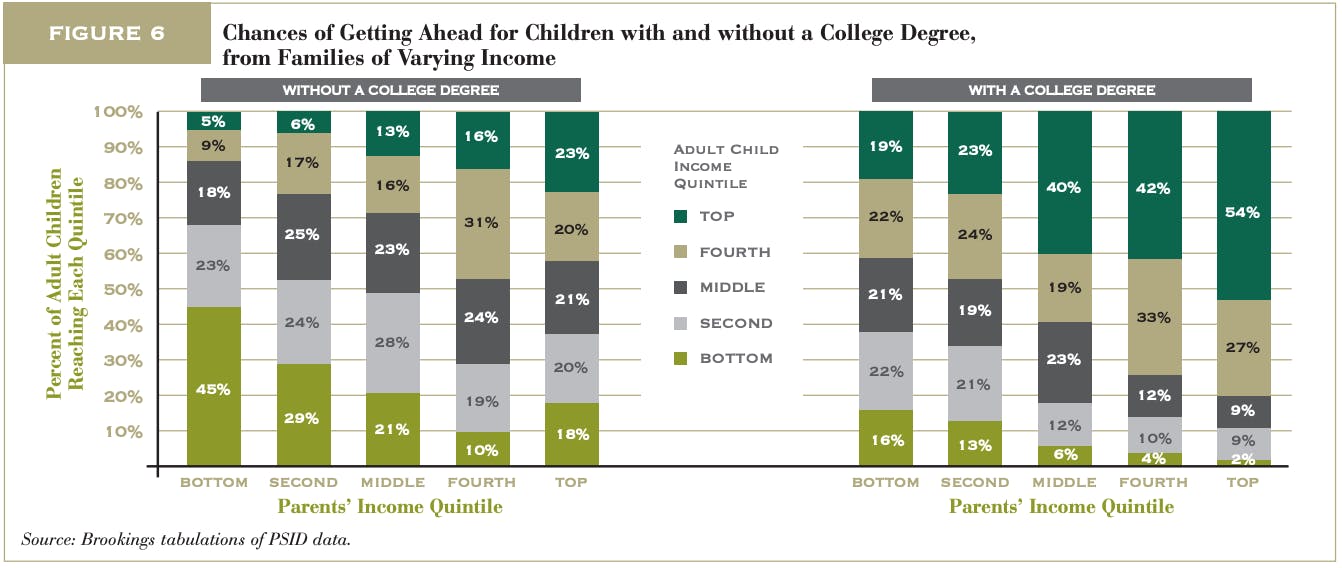
Source: Brookings Institution, Ron Haskins - Education and Economic Mobility (brookings.edu/wp-content/uploads/2016/07/02..)
A college degree, despite the increasingly high cost, still remains the near universal prerequisite to desirable jobs and higher salaries. In some career areas, such as law, medicine, consulting, and finance, bachelor’s degrees are essentially mandatory due to requirements for graduate programs and/or extreme competition. In 2019, 36% of adults 25 and over reported having a bachelor’s degree or higher, compared to only 20% in 1990. In addition, according to the US Bureau of Labor Statistics, in 2020 those with a bachelor’s degree had a median weekly earnings of $1,305, where those with only a high school diploma earned $781, and had significantly higher unemployment rates (5.5% vs. 9%, respectively).
However, over the past few decades, the cost of college has outpaced earnings by a significant margin. According to the Georgetown University Center on Education and the Workforce, wages for new workers grew 20% between 1980 and 2019, while the total cost of college increased over 160%.
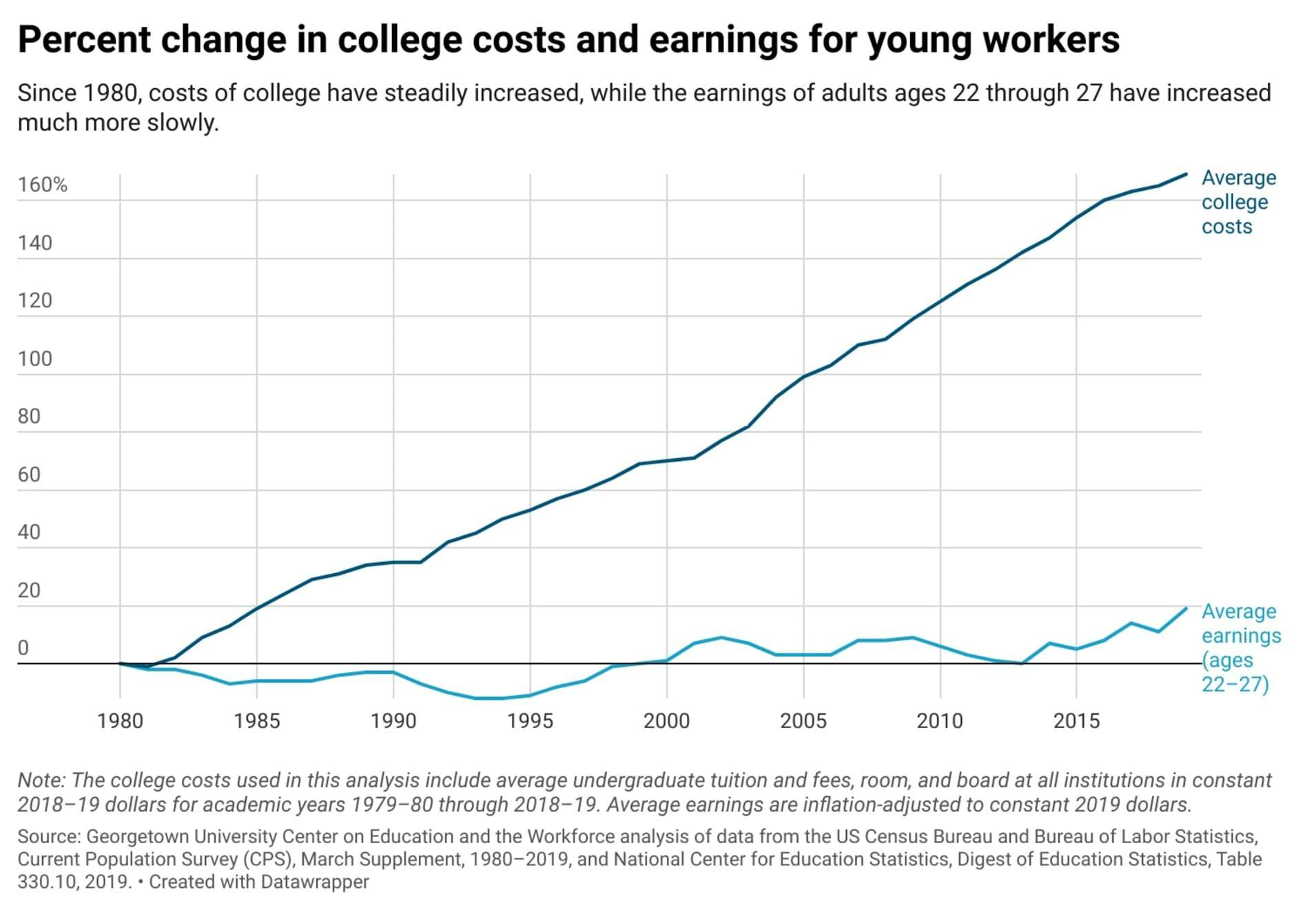
These are just some of the many variables in the calculus to determine if the cost of a degree is outweighed by the potential benefits. Luckily, alternative means of securing a well-paying job in tech are becoming more mainstream and often come at a much lower price tag. Upward mobility, it seems, is attainable from sources other than college degrees.
Bootcamps
Coding bootcamps are short term, intensive programs that offer training in software development. There are also bootcamps for other tech related fields, such as UX/UI Design, Cybersecurity, and Data Science. They are similar to degree programs in that after graduation, it serves as a student’s “proof” of proficiency in a field.
Structure of Bootcamps
Bootcamps are often as flexible, if not moreso, than their traditional degree counterparts. Many bootcamps offer online and in person options. Most bootcamps also have full and part time options, too. The part time options usually end up being longer, but lectures take place outside of regular business hours to allow students to work full time while going through the program.
While all bootcamps take less time than obtaining a traditional degree, there is a wide range of lengths, and intensity and content will be reflected on that length. Programs can be just a few weeks long, but some can run up to 6 or 7 months. Average length, according to a 2019 study by RTI International, is around 16.5 weeks–a little longer than a semester at a college or university. Because of the intensive curriculum, though, much more information can be packed into this timeframe.
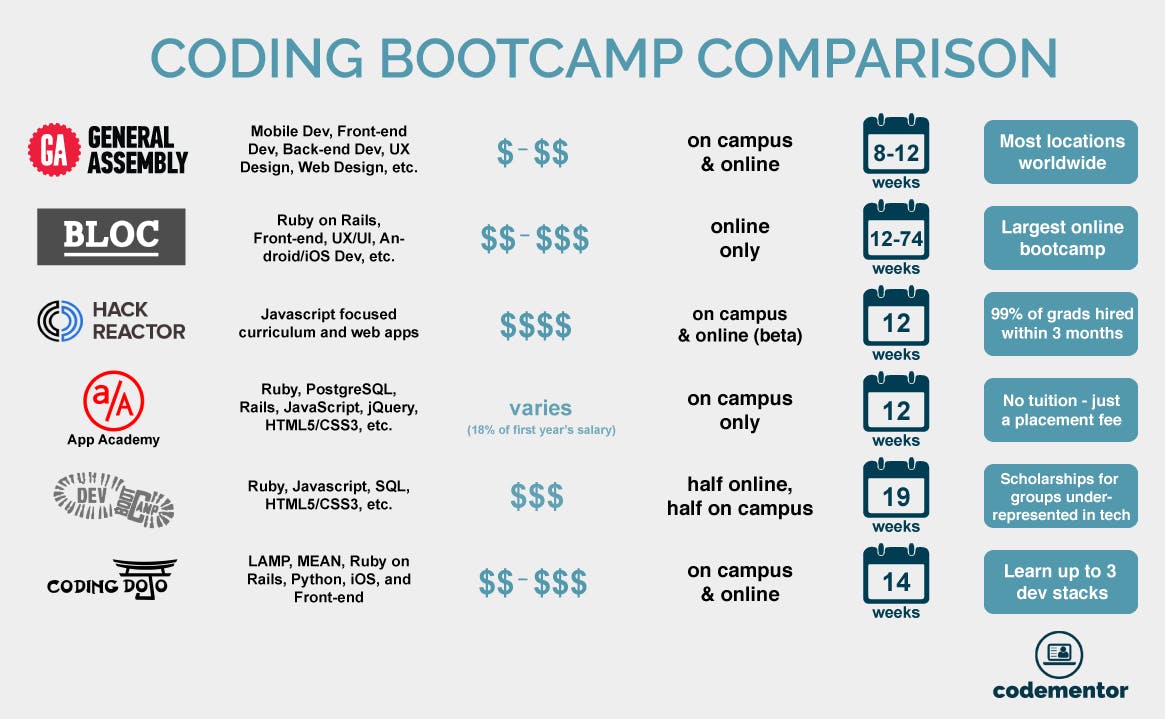
Content of Bootcamps
Where degree programs usually have a large focus on theory in computer science/computer engineering, bootcamps often have more of a focus on hands-on experience. Lectures of course exist, but the programs are often project based and can be organized using Agile methodologies–much like a real company would organize its teams.
Developer bootcamps may split between front and backend content. Lectures could include topics such as Javascript frameworks, APIs, Databases/SQL, and web development. Another interesting offering by bootcamps is technical interview prep; these prep programs also help the bootcamp because when candidates land jobs, it reflects the quality and success of the program.
Shifting Careers with Bootcamps
Bootcamps can be a great option for someone who can’t afford or doesn’t have the time to attend a traditional four-year school, a student who wants to just focus on coding or curriculum that matters to their target job, or even someone who is looking to pivot careers.
The length of bootcamps and part time options create an opportunity to pivot careers. It isn’t uncommon for students to switch careers for various reasons. A commonality of bootcamp cohorts is the diversity of backgrounds of the students: backgrounds in teaching, construction, first jobs, corporate training, those looking for a side gig, and many more.
According to a 2020 report by Course Report, 89% of all respondents were coming from a different industry than IT/Web Development/Design, and 91% of all respondents responded that their goal was to get a programming job. The average 6.9 years of work experience pre-bootcamp also shows that many bootcamp students are switching careers. This not only speaks to the desirability of software development positions but the belief in coding bootcamps as a path to them.
Cost of Bootcamps
The average bootcamp costs about between $13,000 and $15,000 and focuses solely on content relevant to the target industry (no general education requirements like with traditional degrees). While there is no federal student aid for coding bootcamps in the US, there are multiple other ways that students can pay for them.
The most common way to pay, according the study by Course Report, is loans through various student financing platforms/providers. There are loan providers that focus specifically on tech bootcamps and/or career transformation, like Skills Fund and Climb Credit, but also traditional student loan providers like Sallie Mae.
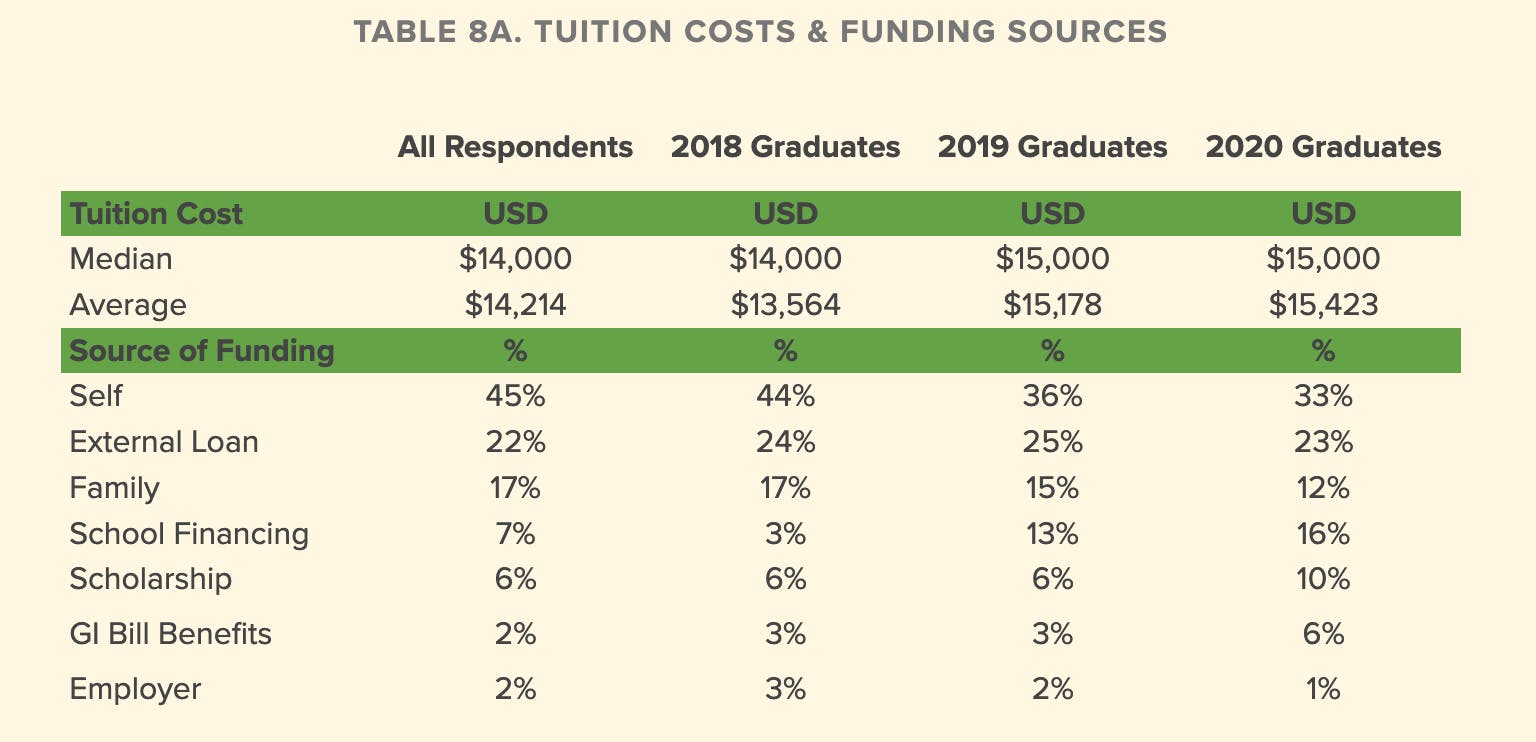
Source: Course Report - 2020 Coding Bootcamp Alumni Outcomes & Demographics Report (coursereport.com/reports/2020-coding-bootca..)
In addition to students taking out private loans to pay for bootcamps, some bootcamps also offer Tuition Deferment and Income Sharing Agreements. Tuition deferment is simply putting off payments until a graduate starts a job at a minimum salary. Income sharing agreements also defer payments until a graduate gets a job, but in these agreements the student shares part of their salary with the bootcamp. While this is sometimes desirable, a graduate could end up paying more in the long run.
Some students may be eligible to apply for some scholarships that can cover tuition costs. In some cases, employers are willing to cover the cost of tuition in order to train employees, too. And, at some eligible bootcamps, there are also GI Bill benefits for veterans.
As with any financial matters, there is not a one-size-fits-all solution. Each person’s situation is unique and this should be considered before taking out a loan or entering into a financial agreement with any institution.
Return on Investment of Bootcamps
The starting salary for a bootcamp graduate depends on the program entered into and the location of the position, but reports on starting salary are generally positive. According to Course Report’s 2020 study, the median salary post-bootcamp was $70,000. Job titles post-bootcamp indicate that most graduates are in programming jobs, and this salary generally aligns with junior/associate level programming positions (again, depending on location due to cost-of-living expenses).
While the COVID-19 pandemic caused some disruptions in 2020, the job placement success of bootcamps is notable. There was a slowdown in hiring and graduates reported it took longer for them to be hired. However, it is likely that in 2021 and early 2022 this hiring rate has picked up again. Many already-hired graduates of bootcamps reported that the only change from COVID-19 was a shift to remote work.
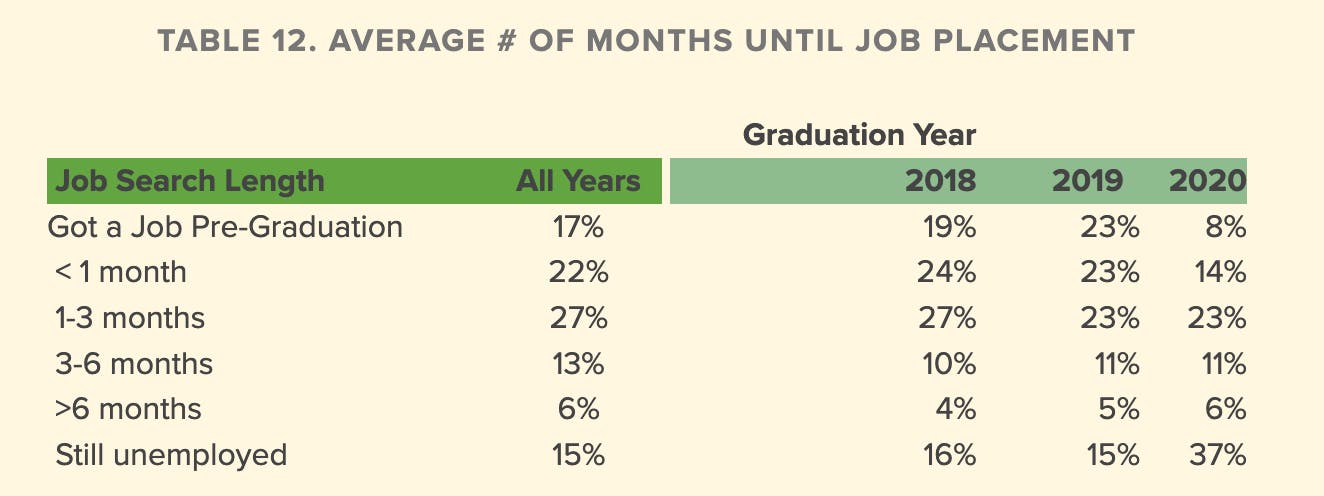
Source: Course Report - 2020 Coding Bootcamp Alumni Outcomes & Demographics Report (coursereport.com/reports/2020-coding-bootca..)
Networking is one of the less quantifiable benefits of bootcamps; like traditional degree programs, students are usually placed in a cohort that will also end up in the same industry. The connections made are as valuable as the knowledge itself. As the old saying goes, it’s not what you know, it’s who you know.
Examples of Bootcamps
Certifications
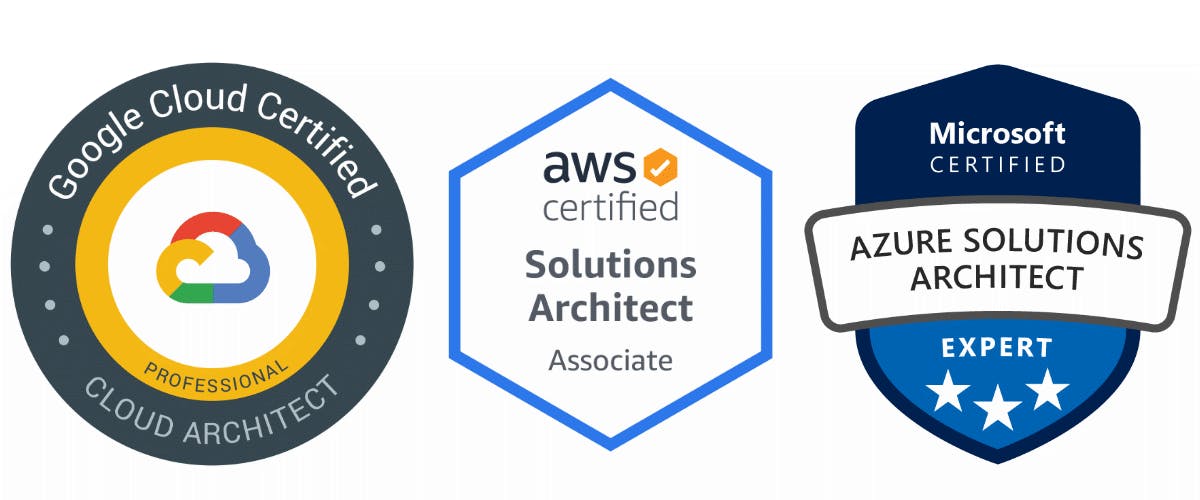 Certifications are a way of validating a set of skills, level of proficiency, and/or knowledge in an area. They are usually more focused on a single subject than bootcamps, and are often self-teach-and-study affairs that end in one exam that will determine whether a student is certified or not.
Certifications are a way of validating a set of skills, level of proficiency, and/or knowledge in an area. They are usually more focused on a single subject than bootcamps, and are often self-teach-and-study affairs that end in one exam that will determine whether a student is certified or not.
Certifications alone are usually not enough to land a dream job; they are generally supplemental to a main education (e.g. traditional degree or bootcamp). But, this is changing with some broader certification programs and employers who are willing to take a chance on impressive candidates. This depends on the employer, the candidate, the role, and the certifications–each student should assess their own situation honestly and plan accordingly.
Cost of Certifications
Certifications are significantly less expensive than bootcamps, let alone attending a 4 year college or university. Since certifications have more narrow focus areas than bootcamps and degrees, and do not require lectures, regular proctored exams, and resources such as housing or office hours, the cost for them only includes exam fees and studying materials.
For example, AWS certification exams cost between $100 and $300, depending on the level of the exam. Study materials for these exams, sourced from Udemy, can cost between $20 and $150 (Note: using a new account on Udemy, resources can be significantly cheaper). At this price level, it is possible that even a college student could afford an AWS certification, and using this differentiation, significantly increase their chances of landing an internship or job.
Example Costs of Cloud Certifications
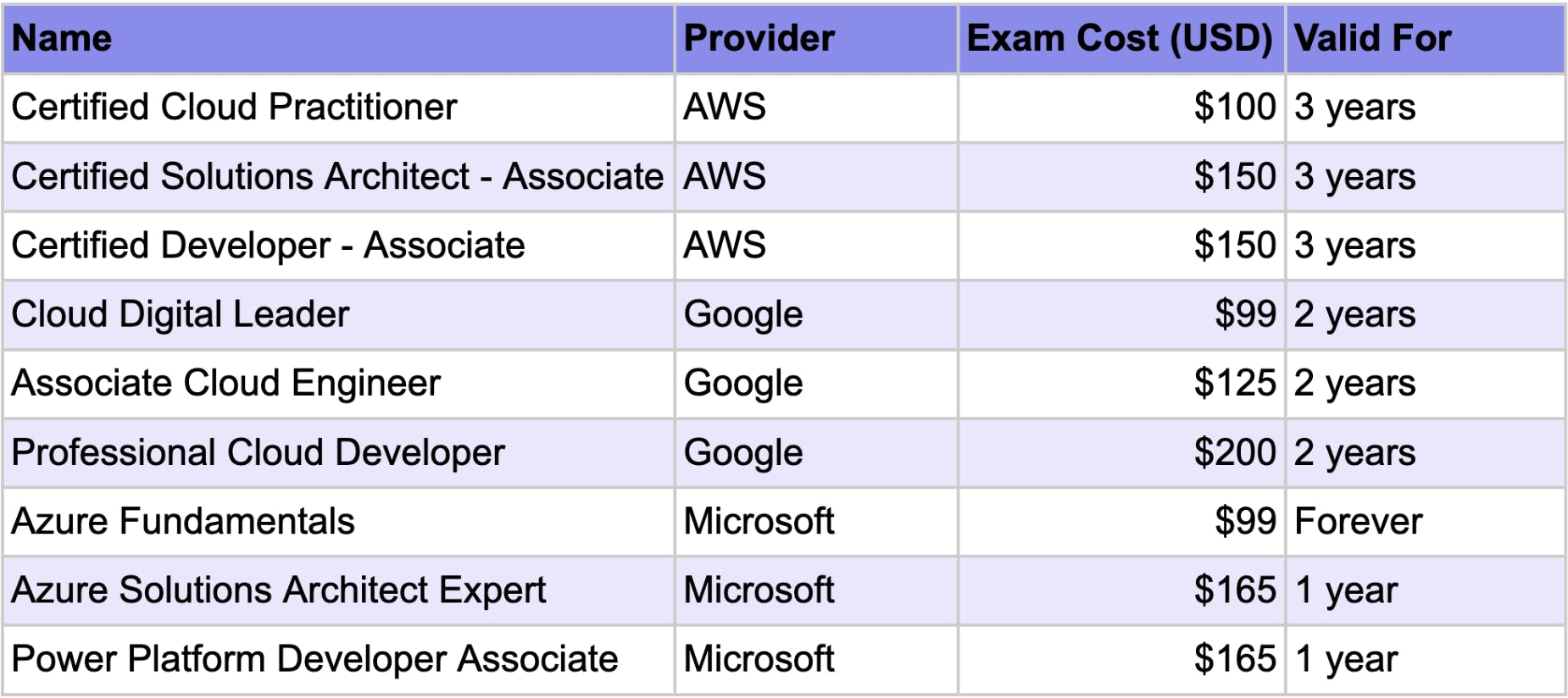
Sources: AWS Certifications (aws.amazon.com/certification), Google Cloud Certifications (cloud.google.com/certification) , Microsoft Certifications (docs.microsoft.com/en-us/learn/certifications)
Employers sometimes have reimbursement programs for external learning to encourage their employees to grow professionally. This is to their advantage as well as the employees, as they get a more talented and valuable employee out of it. Some certification providers also offer discounts for various reasons, including group discounts, second exam discounts, and discounts for veterans under the GI Bill. Before paying for anything, students can check to see if they qualify for any discounts and even check online communities for advice on saving money with certification resources and exams.
Certifications often expire after a number of years. Depending on the specific certification and the content area covered, this can range from 1-3 years. Some providers allow students to simply learn new material while others may require retaking a full exam (and possibly pay for it).
Certifications as Differentiators & Vehicles of Upward Mobility
Certifications are a great way to differentiate candidates from the competition in terms of applying for a position. A candidate with certifications shows they can self teach–an incredibly important skill for someone in a rapidly changing field like tech. It also shows they have time management and organizational skills to be able to juggle studying for a certification while doing whatever else is on their resume. Any hiring manager will see certifications as a positive and move that resume to the next level of consideration.
For those already in the industry who are vying for a promotion, certifications provide many of the same benefits. They show employers a candidate has ambition, curiosity, and drive to learn. On top of this, the content that the certifications cover can also apply to projects which a team is working on and add value to the company. For example, if a team is interested in serverless technologies and what they can do for their project, one or more team members may get the AWS Developer - Associate certification. They then can be the subject matter expert(s) for the team and lead forward development of a new serverless infrastructure.
Certifications are even useful for college students. At their low price tags, a college student could afford a certification and use it to their advantage in a search for internships. It’s unlikely that many internship candidates have certifications, so companies are far more likely to hire an intern who has certifiable skills.
Examples of Certifications
- Google Career Certificates
- Google Cloud Certifications
- Amazon Web Services (AWS) Certifications
- Microsoft Certifications
Conclusion
While a degree is still the most common way to achieve a higher salary and break into certain industries, there are still many costs and drawbacks to consider. Alternatives to traditional degrees are becoming a more common way to start a career. In comparison with a traditional degree, coding bootcamps and certifications are a much more affordable way to validate knowledge with employers and show off skills. Bootcamps are a cheaper, short-term alternative to degree programs that are popular among people trying to switch into a tech career. They are generally successful in quickly placing graduates in entry level positions without as much debt as a traditional degree program from a college or university. Certifications are another way to supplement a resume, differentiate a candidate from the competition, and verify expertise in a topic all at a low price tag. Depending on the student, these alternatives may be a better path to a dream job and successful career than a traditional degree.
Resources
- brookings.edu/wp-content/uploads/2016/07/02..
- census.gov/prod/cen1990/cqc/cqc13.pdf
- census.gov/newsroom/press-releases/2020/edu..
- bestcolleges.com/bootcamps/payment/bootcamp..
- bestcolleges.com/bootcamps/payment/paying-f..
- rti.org/rti-press-publication/alternative-a..
- grow.google/certificates
- docs.microsoft.com/en-us/learn/certifications
- aws.amazon.com/training
- bls.gov/emp/chart-unemployment-earnings-edu..
- coursereport.com/reports/2020-coding-bootca..
- codementor.io/learn-programming/coding-boot..
